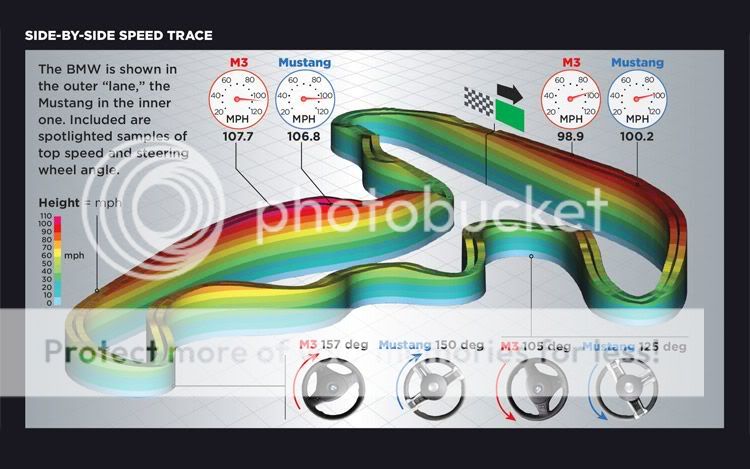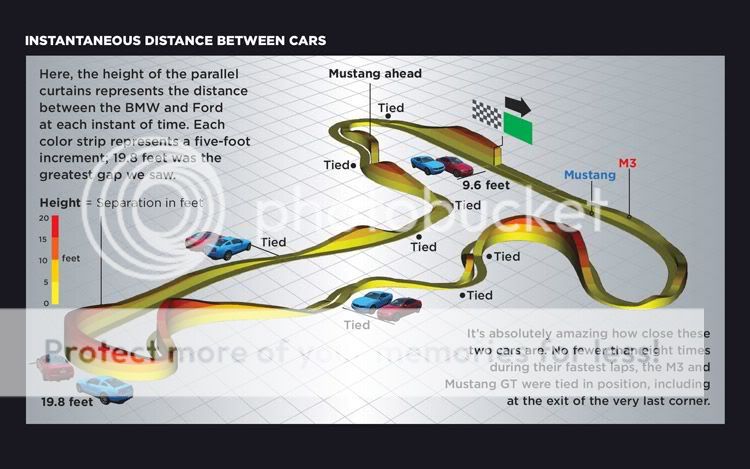- :
- 2011 Mustang GT

Comparison: 2011 Ford Mustang GT vs. 2011 BMW M3 Coupe
No, We're Not Kidding
From the October, 2010 issue of Motor Trend / By Ed Loh / Photography by Brian Vance
"Now are you high or just stupid? An M3 against a Mustang GT? On a racetrack? Seriously, son, which one is it? High or stupid?"
Yes, we know how this sounds. And had we suggested this matchup just a few months ago, we would deserve more withering scorn than can found in a week long Judge Judy marathon.
Why? Because this Munich versus Motown matchup has never been done before. Not even considered because it just didn't make sense. Sure, the M3 went V-8 in 2008, but that's not the issue. The truth is, the Mustang GT was never good enough to challenge Bavaria's finest. That is, until now.
Your doubt is understandable, but check the specs. For 2011, both rear-drive, four-seat coupes use all-aluminum V-8 engines with double-overhead camshafts tickling 32 valves. The M3's 4.0-liter carryover makes 414 horsepower at 8300 rpm and 295 pound-feet of torque at 3900 rpm. The Mustang's all new 5.0-liter V-8 cranks out 412 ponies at 6500 rpm and 390 pound-feet at 4250 rpm. But the most compelling number is 0.2: the difference in power-to-weight ratio between the two. The Mustang carries 8.8 pounds per pony to the M3's 8.6. And yet, at the test track, the 5.0 equals or betters the M3 in every performance category we measure. Both hit 60 mph in 4.4 seconds, but the Mustang is faster to the quarter mile by a tenth of a second and 0.7 mph-12.7 seconds at 111.6 mph. It also stops two feet shorter from 60 mph-a tie as far as we're concerned-and the GT really shatters the M myth on the skidpad. America's original ponycar manages to outgrip one of Germany's most iconic sports cars to the tune 0.2 second through our figure eight and by 0.01 g in lateral acceleration.
But the M3 is the better driving car, right? What about the vaunted BMW steering feel, cornering agility, and legendary suspension tuning? Sure, the Mustang's antiquated live rear axle is fine at the strip (and skidpad, apparently), but the M3 must be faster where it counts: on a racetrack, against the clock. Well, hold onto your buts (and butts), because we are about to find out.
To keep things fair, we spec a brand-new 2011 M3 Coupe with only 1300 miles on the clock. It comes with all the extra goodies that make the M3 a world-class tourer, but the option that most interests us is the new Competition Package. This $2500 kit provides a slightly wider track via higher offset 19-inch wheels and improved grip by way of stickier tires and suspension lowered 0.4 inch. Combined with revisions to the M3's electronic damping control (EDC) and dynamic stability control (DSC) systems, BMW claims the Competition Package-equipped M3 is "the best-handling production M vehicle ever built." Hmmm, hope they mean on a racetrack...
To meet this challenge, we ask Ford to send us a 2011 Mustang GT Premium with optional 3.73 gears ($395) and Brembo brake package ($1695). We also request nearly all the luxury options available (except the glass roof, for weight reasons) to make it a comparable GT. This explains the fancy stripes on the leather seats, HID headlamps, and Sync-based infotainment system.
Despite all the box checking, the only thing we can't equalize is the price. In fact, the chasm between the $67,025 M3 and $40,275 Mustang GT can easily be filled with, well, another Mustang.
Ah, but is it worth it? That's the $26,750 question, and for the answer, we implement a plan cribbed from basic cable. Behold, Mustang versus M3, "Pros vs. Joes"-style.
The concept is this: To definitively determine which car is faster is relatively easy. We rent the 1.8-mile Streets of Willow Springs road course and employ the services of Randy Pobst, the very same championship-winning pro driver we use for our semi-annual Best Driver's Car showdown. Not only can Randy extract the fastest lap from anything with four wheels, he can tell you why it's so fast. To determine which car is better in the hands of the common man, well, that's this Joe's job.
To keep things safe (for me) and fast (for Randy), we lap separately and with slightly different setups. I go out first, with all the traction and stability controls engaged, but set to the sportiest settings. A bit of yaw is available via Ford's AdvanceTrac and BMW's M-Drive system, but not so much that I could end up backwards in the tire barrier (known to happen). For those playing at home, that means I hit the Mustang's traction control button once to put it in Sport mode. For the M3, I set throttle response to SportPlus, Servotronic steering and EDC to Sport, and DSC to M-dynamic mode.
Randy's setup is far simpler: Just turn everything off and get the hell out of his way.
So which is faster? We didn't tell Randy until the very end, so we won't tell you yet, either. This is called dramatic tension, and it's created by discussing the relative merits of each vehicle -- Mustang first.
That the 5.0 will lay two sets of stripes out of every corner isn't the surprise, it's how clean and in control the car feels while doing it. Another shocker is how hard it dives when those four-piston Brembo calipers bite down.
"The car stands on its nose when you go to brake," says Randy, "And there's a fair amount of squat, so you feel a lot of pitch. It doesn't seem to be hurting the cars braking or entry that much, but it's disconcerting."
We both found the 5.0-liter responsive and fantastic, but split on the six-speed manual. Rev-matching the rumbling V-8 is easy for me, but surprisingly, Randy can't be bothered. "I just skipped second. The shifts take so long that with the torque curve from the V-8 engine, it's better to just leave it in third gear," he says. "It comes out of these tighter corners at about 4000 rpm and it pulls!"
As for steering, the Mustang's is fast but lacks feedback. "I'd give the steering about a B in feel but an A in quickness. The ratio was about perfect," concurs the pro.
That live rear axle setup? A non-issue for both of us. "The undulations I felt at high speeds in the bumps did not appear to be coming from a lack of control of the rear axle," says Randy, who suspects a damper issue. "The shocks can handle the car up to 60 to 70 mph. At 80, 90, 100 mph, we have a really challenging set of curving bumps and braking zones for which the shocks are overmatched."
So, shockingly good on the road course, but enough to beat the M3? Perhaps, because the first thing out of Randy's mouth after lapping the BMW is, "I missed the mid-range torque of the Mustang. The BMW ramps up more slowly and is skewed toward high rpm whereas the Mustang has a much broader, flatter torque curve."
"Another surprise was the BMW understeers more. A lot more," he continues. "And that for me, took some of the fun out of it. It made it an easier car to drive fast, but it was not as much fun. The balance wasn't as good."
But the BMW shines where it matters most: "The BMW has far better shock control when being driven hard, which gave tremendous advantage on the hairiest part of this track," says Pobst. "I don't know for sure how fast my speed was, but it sure felt a lot quicker in the BMW."
Which is why when pressed, Randy admits that he believes he set the fastest lap in the M3. So do I. "I think the BMW is faster because of its superior shock control at high speed," he says. "It has very little nose dive, very little brake dive, which gives me more confidence as a driver. It's more refined, a more conservative car than the Mustang is and far better controlled."
But is it faster? No, at least not with this Joe behind the wheel. Forget that my fastest laps were about 3.8 seconds slower than Randy's. There's an easy answer for that: "The pro don't pucker," observed tech editor Kim Reynolds after poring over the data (see graphic, previous page). All you need to know was that I was 0.55 second faster in the Mustang than the M3. My reasoning: the 5.0's broad powerband and less intrusive electronic stability-control system help me exit corners faster and maintain momentum.
For the definitive answer, we go to Randy's times: 87.67 seconds in the BMW to 87.76 seconds for the Ford. That's right, the difference between the fastest laps of the M3 and Mustang GT is, literally, less than an eye blink: 0.09 second, to be exact.
Randy's response? "God bless America! Let's hear it for the Mustang. To me, that is a giant win for the Mustang GT because the BMW is such formidable competition."
What about us? Do we take Randy's advice and name the Mustang, even in defeat, the winner? No. Although it may test better, cost less, and lap faster in the hands of (an exceptionally) common man, on this day, the Mustang is beaten fair and square where it matters most. But that's not the reason we are loath to call the Mustang America's M3.
A Mustang is a Mustang. Always has been, always will be, no matter how close it comes to knocking off one of the world's finest sports cars. Even if it had fully scalped the Bavarian, that wouldn't change the fundamental ethos of a legend 46 years in the making: fast, fun, and within reach of everyman. It's not America's M3. It's America's Mustang.
WHO'S NEXT?
Recently, we pitted the mighty M3 against the Audi RS5 and Cadillac CTS-V, a triple throwdown the BMW handily won. So does that automatically advance the Ford over the Audi and Caddy?
Not so fast. That matchup dispensed with the track showdown of this story and heavily weighted performance as a luxury GT. That's a goldplated gunfight for the sharp, but knife-wielding Mustang.
While there is reason to suspect the Mustang GT could dispatch the RS 5 at the track, the CTS-V's brute power and tricky magnetic shocks present a more enticing challenge. Anyone for Mustang Shelby GT500 versus Cadillac CTS-V coupe in a winner-take-all test of 500-horsepower supercharged supremacy? Give us your thoughts in the comments below.
1ST PLACE: BMW M3
Did you blink and miss the M3's onionskin advantage over the GT? Here's a hint: It's in the chassis, not underhood.
2ND PLACE: MUSTANG GT
Never has a loss felt so much like a win. From not once considered to full-blown contender, 5.0 officially puts the world on notice.
Joe vs. Pro
Drivers 2011 BMW M3 2011 Mustang GT
JOE 92.07 sec .................91.52 sec
PRO 87.67 sec .................87.76 sec
Pro Pobst proves 3.8 seconds a lap faster than your humble scribe in the Mustang, and a whopping 4.4 seconds faster in the M3. Is that embarrassing? Yes, but that's why we hired him. Final thoughts: "Both are really rewarding to drive. The BMW is far better controlled while the Mustang is more of a wild ride."
Deep Drive
We've graphed the M3's and Mustang's Streets of Willow performance as side-by-side "curtain graphs." Following up on Randy's comments about the Mustang's greater nosedive, we measured it at the dragstrip; for comparison purposes, they're shown stopping at 1 g (with pitch angle in yellow). Randy was right.
Side-by-Side Speed Trace
The BMW is shown in the outer "lane," the Mustang in the inner one. Included are spotlighted samples of top speed and steering wheel angle.

Instantaneous Distance Between Cars
Here, the height of the parallel curtains represents the distance between the BMW and Ford at each instant of time. Each color strip represents a five-foot increment; 19.8 feet was the greatest gap we saw.

It's absolutely amazing how close these two cars are. No fewer than eight times during their fastest laps, the M3 and Mustang GT were tied in position, including at the exit of the very last corner.
Maximums 2011 BMW M3 ...2011Ford Mustang GT
Lap time, secs .....87.67 .....87.76
Top speed, mph .....107.7 .....106.8
Highest accel g .....0.47 .....0.39
Highest braking g .....0.9 .....0.95
Max lateral g .....1.32 .....1.3
Link
